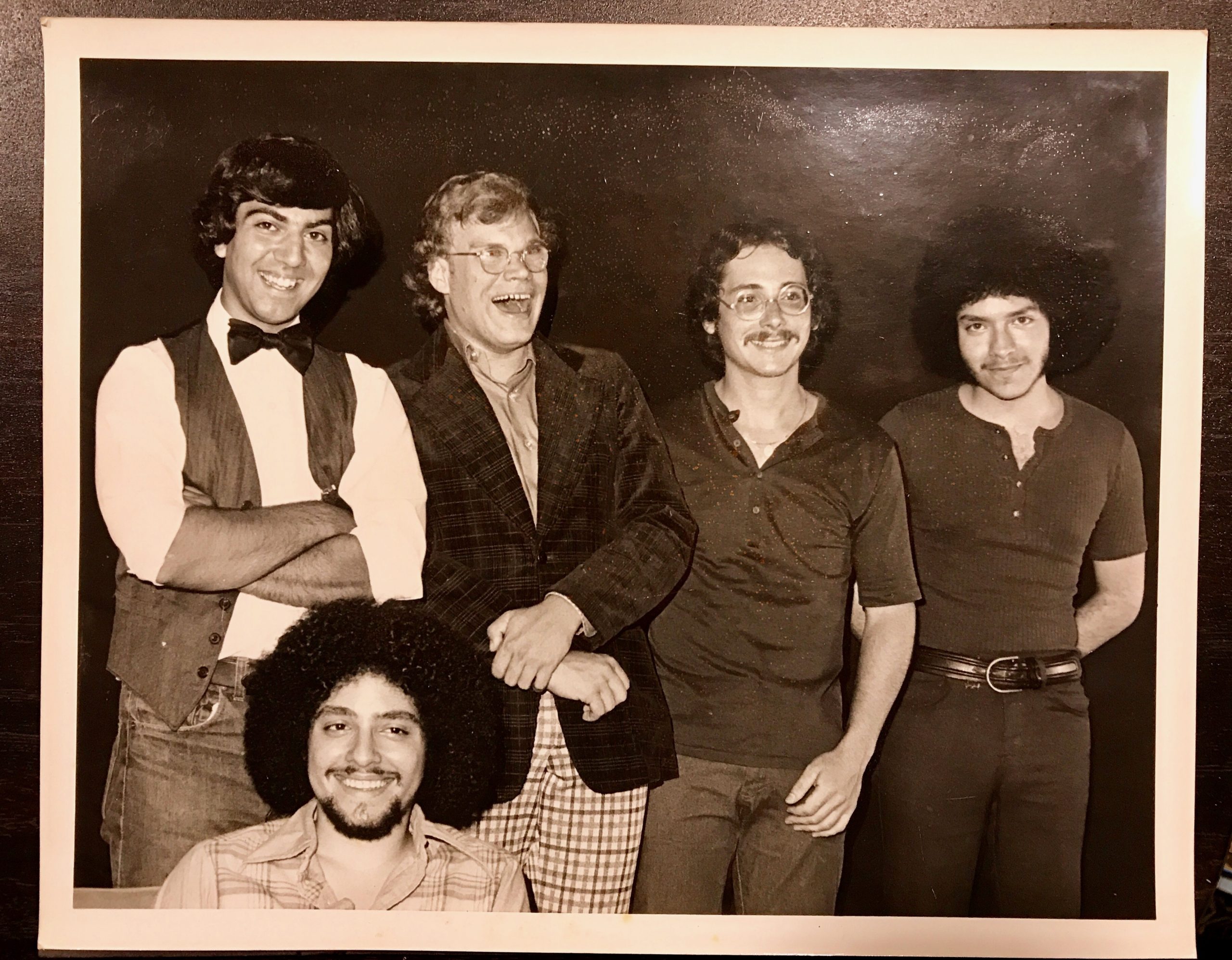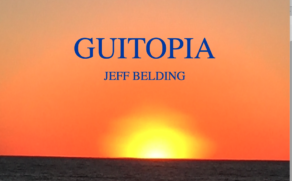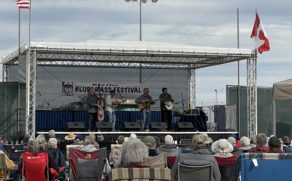This is a tale that began fifty or so years ago. It covers rock bands and musicians in NY’s Hudson Valley meeting by chance and in some way affecting each other’s careers over this long arc of time.
About Stockade
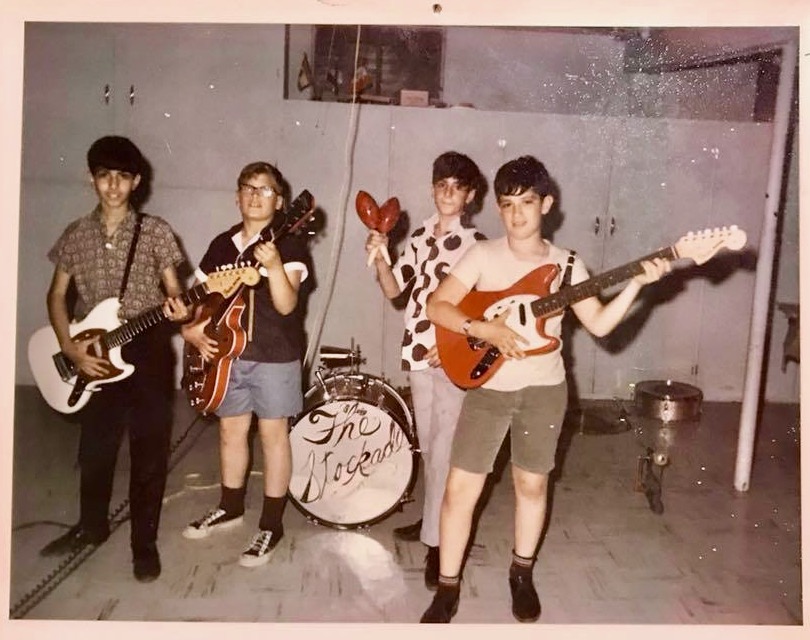
My career as a rock musician was in full swing by 1968. I was playing guitar in a band called Stockade. The band consisted of myself and four other guys “about my age” from my neighborhood and our local school in Hyde Park New York. By 1969 we had a full repertoire that consisted of mostly covers of bands like Grand Funk Railroad, Mountain, Santana and Ten Years After.
One day we found ourselves taking part in a summer festival in upstate New York. No, not that really big one. This was more “local yocal” but also took place on a farm in the middle of nowhere sometime in 1970.
At that time, Stockade was a bit of a novelty being that we were ages 12 to 14 years old, so most of the time we would get a pretty high billing at a festival such as this. But the festival was looking for a “bigger name” band to headline, and they found it in NRBQ.
About NRBQ
Now we had heard of NRBQ, but had never seen them live. Our manager, Dominic Francese Sr. took “us kids” to a lot of concerts in our day. We had seen Iron Butterfly, Grand Funk Railroad, Yes, Black Sabbath, Spirit and a bunch of other (mostly) “heavy metal oriented” groups.
NRBQ was like nothing we had ever seen or heard before. Their stage presence was infectious. They had a way of inviting the audience in to think and act “crazy.” Their sound was kind of like fifties rock n’roll meets funk meets country meets rockabilly all put in a giant blender and out pours this new genre of music. Fronting the band was a singer named Frank Gadler whom I would cross paths with again one day.
Anyway at the end of the festival someone (probably our manager) had asked Frank Gadler “What did you think of our band Stockade?” He replied, “Oh you mean Little Santana?” That was pretty much his commentary. At that time, we ended our sets with Santana’s “Soul Sacrifice” so that was the basis for his impression of us. To this day, I don’t know if it was a compliment or a dig.
Stockade “Grows Up”
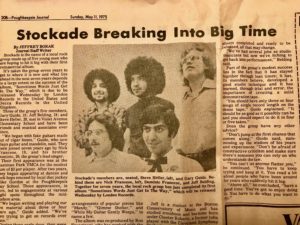
Anyway from that day forward our musical intentions and priorities shifted. We dropped a lot of our cover tunes because we no longer wanted to “sound like” someone else. If we did cover someone else’s stuff, we did it our “own way” with our own unique arrangements. We did start covering some NRBQ numbers because we had become so interested in their eclectic mixes of genres as well as their more “zany” stuff. A tune of theirs called “Rocket Number Nine” comes to mind. The middle section of that song is a veritable smorgasbord of sound effects and theatrics.
This was also a time when writing our own original music became more of a priority. We began the process of shopping our original material to record companies and one day that the would lead to “some success.” But that’s another story . . .
The Moonshiners and Willie Amrod
Stockade rode a decent-sized wave for some 12 years or so, but all waves must one day come crashing into shore and so that day came when we decided to call it quits. Toward the time of Stockade’s demise (the late 70s), I had become enamored with bluegrass banjo, and had found a great teacher of the instrument in Roger Sprung. He lived close enough for a weekly lesson.
I was also working out some country rock covers with my friend Tony and we gathered up some more Hyde Park “cats” to form a band that we named “The Moonshiners.” The band was the perfect venue for me to work out my new banjo repertoire. We also brought in Gary formerly of Stockade who was pleased that he had a venue to work out his newly found interest in the pedal steel guitar.
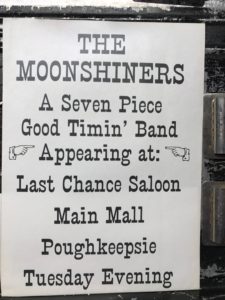
Our biggest problem seemed to be finding a bass player that we could live with, or who could live with us. Like the movie, “This is Spinal Tap” where drummers “disappearing” was an issue, we seemed to have the same problem keeping a permanent bass player.
One of the bass players who “came through” the Moonshiners was Willie Amrod. He was not only a solid bass player, but a great singer and stage performer. He also owned a bus company that provided tour buses for bands like “Squeeze” and “The Tubes” among others.
Needless to say, he was well-steeped in the music business from many angles. He was also good friends with the various members of NRBQ, which would come in handy for me one day a few decades later.
I don’t recall how long Willie was our bassist or why he (like several others) left us, but I assume he had other musical pursuits as well as his rock and roll bus company that required more of his attention. And so, exit Willie Amrod probably for good as far as I could tell. The Moonshiners did continue on for a few more years with another bas player (or two).
Life goes on and then a phone call
Almost three decades had passed since my days in Hyde Park with “The Moonshiners.” I had been married, moved north to Albany NY, had two daughters and continued hammering out a life teaching and making music. Through those years, I would go back to Hyde Park from time to time to play gigs with my many musical cronies from the past.
At one Moonshiners re-union, I noticed Willie Amrod in the audience while I was playing banjo on “Midnight Moonlight” a cover of the “Old and the Way” tune. We had a quick hello and exchange afterward and I thought once again, exit Willie and that would be that.
A couple of years went by when I got a message on my answering machine from Willie. The jist was that he was working on a new musical concept – a hybrid of country and funk music and he wanted somebody who could play a “funky” groove on the banjo. That somebody was me, and though I was skeptical at first, I got back to him and said that I’d give it a whirl.
Funky Banjo?
Fortunately the trip to Willie’s studio was only about an hour’s drive. And so I arrived at the “compound” for the first time, banjo in hand, ready to play “whatever” on it.
I wound my way through a labyrinth of buses in various states of repair, rooms full of tools, past a couple pianos that had seen better days, and I finally got to the “inner sanctum” where the studio was located.
I exchanged pleasantries with Willie and his engineer Danny. Danny and Willie were both former Moonshiner members, so it was nice to know I was in a situation where I was at ease with the people in the room. Danny is truly a great guitarist/musician, so I knew I would hear great results with him behind the console.
I sat down on a stool with my banjo in a very large room where a full band would obviously set up and play. However in this case, I was alone in the room listening to a playback of what “The Willie Amrod Band” had already completed. There were no vocals on the recording yet so I was just “playing to a groove.”
The first song I played on was “Country Funk Music” which was Willie’s “signature song” at the time. The first time around I threw in every lick I knew that was in a D blues vein and I thought it was pretty cool if I do say so myself. Willie listened back to what I had done and at some point stopped the tape. He said, “Do you hear that?” It was just two measures of something that I croaked our during this barrage of licks. He then asked “Can you do just that “bit” for the whole song the next time around?”
So I complied, playing those two measures over and over for the entire song. It felt kind of silly getting paid for something I could probably teach a chimpanzee how to do. However when I heard the final play back of “Country Funk Music” with the lyrics I realized it worked really well.

I continued adding banjo to other songs on Willie’s album. He also had me add banjo to a song on Frank Gadler’s (Yes – that Frank Gadler from NRBQ) up and coming album. That song had a one measure banjo lick that went “on and on” but again it worked! And later on, I got some nice compliments from Frank Gadler himself when playing my banjo in his back-up band which included engineer Danny on guitar and Willie on bass.
Here’s a link to the Amrod Brother’s website – some good footage with Frank Gadler http://amrodbrothersband.com/about/
Is there a moral to this story?
I’d like to think so. For me, it made me realize that every contact I’ve had in these past five decades, no matter how brief or insignificant it may have seemed at one time, is potentially everlasting and profound. Over these many years in the music business, I have had the good sense not to burn any bridges with any of the myriad people I have worked with.
When we’re “young and foolish” we don’t realize the significance fo these different people with whom we cross paths. For me, it was a life long love of the music of NRBQ that somehow lead me back to playing banjo for their lead singer. And, it was Willie who was the conduit for making that happen with his new musical ideas.
I think the moral here is to take heed of the people around you especially if you are just starting out in the business of music. Get to know them – show an interest in them. Offer your support if they need it and don’t hesitate with the idea of doing them a musical favor. It doesn’t matter how many years pass they will remember you for the good works that you have produced in your time.
You may be working with them again someday!
Oh and here’s a clip of the tune “Country Funk Music” – enjoy the funky banjo –
http://amrodbrothersband.com/wp-content/uploads/2017/04/05-Country-Funk-Music.mp3

